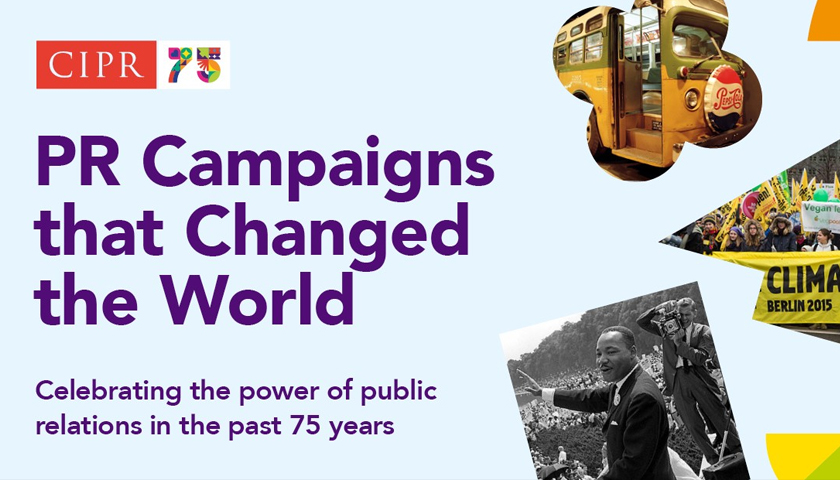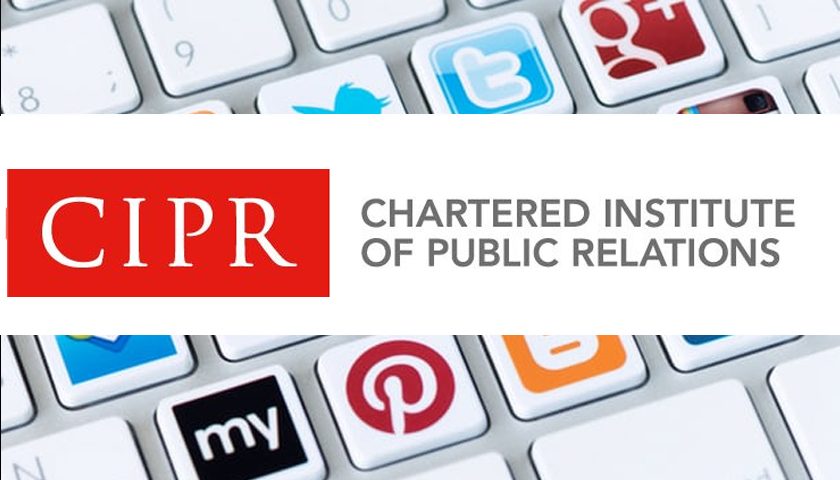Behind every influential campaign and social movement lies a story of individuals who harnessed the power of public relations for the greater good. As part of a series of events to mark its 75th Anniversary, the Chartered Institute of Public Relations (CIPR) has launched an initiative to tell those stories. It is searching for the ultimate Campaign that Changed the World from the last 75 years.
The Institute is asking the public to vote on what they see as the most influential campaign from a shortlist determined by a panel of expert judges. Assigned a decade each from 1948 to the present day, they were tasked with selecting a campaign that has shaped and defined society. Further work was done by the Institute to research the planned public relations work for each campaign. Voting is open until the end of Friday 23 June. The winning campaign will be announced the week after.
From the stirring speeches that fuelled the civil rights movement, to the powerful imagery that shifted cultural perceptions on climate change and the strategic launch of products and services that captured the public imagination, the use of planned PR techniques has changed the world by shaping narratives, fostering dialogue, and driving societal transformation.
The judging panel – chaired by CIPR Board member Professor Emeritus Anne Gregory – brings together an international group of respected senior professionals whose expertise spans the public, private and NGO sectors, media and consultancy. Their chosen campaigns are:
- 1948-59 Rosa Parks and the Montgomery Bus Boycott chosen by John Harrington, Editor of PRWeek UK
- 1960-69 Civil Rights Movement in the United States chosen by Alex Aiken, Executive Director, Government Communication Service
- 1970-79 The first Earth Day chosen by Solitaire Townsend, Chief Solutionist & Co-Founder, Futerra
- 1980-89 AIDS Activism: a medical breakthrough chosen by Daniel Tisch, Chairman, Argyle PR
- 1990-99 Virgin Atlantic vs British Airways chosen by Mark Borkowski, Founder, Borkowski PR agency
- 2000-09 iPhone Launch chosen by Prita Kemal Garni, Founder and Director, LSPR Communication and Business Institute
- 2010-19 Climate Change: The Paris Agreement chosen by Winnie D’Eath, Senior Communication Adviser, WWF International
- 2020-23 COVID: vaccinating the world chosen by Chris Hopson, Chief Strategy Officer, NHS England
The Institute of Public Relations was established in 1948 with the mission of promoting the ethical, competent and professional use of public relations to enhance society. We were awarded a Royal Charter in 2005 to recognise and elevate the importance of that work. As part of our 75th anniversary we want this initiative to showcase some of the many instances where public relations has been a significant force for good in shaping societies across the world for the better. This collection of monumental movements, events and campaigns vividly illustrates the point.
CIPR President Steve Shepperson-Smith Chart. PR, FCIPR
We are very grateful to the judges for identifying these world changing campaigns. I’m struck by the common theme that ties them together: they are about movements. Pivotal moments that galvanised change involving millions of people, whether that’s about the world awakening to injustice, shaping consumer choice, generating a new relationship with technology, transforming attitudes to health issues or driving action on our natural environment. This is public relations making a positive contribution and helping change the world: it doesn’t get more important than this.
Professor Anne Gregory Hon FCIPR
The Judges’ shortlist
1948/59 Rosa Parks and the Montgomery Bus Boycott. Selected by John Harrington, editor, PR Week
The moment that kick-started the US civil rights movement and became a blueprint for modern protest movements in the country and far beyond. Convincing the entirety of Montgomery’s African American population to take part in a boycott was not an easy task due to the community’s reliance on the public transport network and a significant amount of planned work went into ensuring the protest was a success.
“The campaign was about far more than PR, but at its heart were many ingredients that make a success comms campaign.”
1960/69 Civil Rights Movement in the United States (Martin Luther King and Washington March). Selected by Alex Aiken, Executive Director of the Government Communication Service
In the US, the long-standing civil rights movement generated a new approach to campaigning which led to three significant pieces of legislation, Civil Rights (1964), Voting Rights (1965) and Fair Housing (1968). Acknowledging that peaceful protests would generate violent police responses were important for the campaign’s communications and getting mass attention to affect the image of the U.S. government with international audiences.
“A significant influence on political change was the series of campaigns which employed high profile, creative, mass protests which targeted injustice.”
1970/79 The First Earth Day. Selected by Solitaire Townsend, Co-Founder, Futerra
April 22 1970 marked the world’s first Earth Day, which mobilised 20 million Americans to protect our planet. The event centred on dialogue and discussion rather than protest and maximised media publicity thanks to a strong communications strategy.
“American Senator and environmentalist Gaylord Nelson delivered a series of lectures following an already increasing public consciousness around air and water pollution. It’s easy to overlook how Earth Day infiltrated our language, culture & media – normalising environmental mindsets.”
1980/89 AIDS Activism: a medical breakthrough. Selected by Daniel Tisch, Chairman of Argyle, Canada
The campaign for AIDS research and treatment changed the way drugs were identified and tested, shifted perceptions of LGBTQ+ issues, and created a model for patient advocacy that endures today. A planned effort to attract media attention through civil disobedience and public demonstrations was part of its identity as a campaigning group.
“LGBTQ+ activists, led by the AIDS Coalition to Unleash Power (ACT UP), created a social protest movement with a larger purpose: advocacy to make AIDS research and treatment a public health priority.”
1990/99 Virgin Atlantic vs British Airways. Selected by Mark Borkowski, Founder, Borkowski
The David vs Goliath battle between Virgin Atlantic and British Airways in the early 90s exposed BA’s unethical practices and helped Virgin capture the public’s imagination. Provocative marketing campaigns, high-profile lawsuits exposing BA’s unethical behaviour, and numerous stunts using Richard Bran-son’s personal brand as a pillar were all used to gain attention.
“The campaign generated massive publicity for Virgin Atlantic, damaged its main rival’s reputation and demonstrated the power of bold creativity to challenge established players.”
2000/2009 iPhone Launch. Selected by Prita Kamal Gani, Founder & CEO LSPR Communication and Business Institute
The iPhone’s launch had a significant cultural impact, not just on technology but on society. Much thought went into the PR that focused on creating a narrative around the iPhone as a unique and revolutionary device.
“The iPhone launch was a PR triumph for Apple, marking a turning point in the mobile phone industry. The iPhone presented a fresh perspective on technology, creating a buzz that resonated globally.”
2010/2019 Climate Change: The Paris Agreement. Selected by Winnie De’Ath, Senior Communication Adviser, WWF
This was a historic landmark agreement: one that saw virtually every country in the world agree to take real, enforceable action to combat climate change. Coordinated worldwide public demonstrations were at the forefront of the campaign as they helped build the narrative of a global civil society calling for change.
“With a treaty anticipated at the COP 21 in 2015, this was a pivotal year for climate communication. From Earth Hour in March to Earth Day in April public momentum was building. The Climate Action Network (coordinating over 1800 non-governmental organisations in over 130 countries) ensured there was consistent messaging in the run-up to the UN Conference.”
2020/2023 COVID-19: vaccinating the world. Selected by Chris Hopson, Chief Strategy Officer, NHS Eng-land
Covid-19 was the biggest public health risk from infectious disease for 100 years. Successful vaccination campaigns, delivered at rapid speed, have been central to preventing unnecessary mortality and serious illness. The campaign made use of traditional media outlets, public service announcements, social media channels, influencer online advertisements, and community programmes in a coordinated PR campaign.
“Every health system had to rapidly build awareness of the need for vaccination; overcome vaccine hesitancy; combat aggressive disinformation campaigns and support their population to come forward to the right place at the right time. That’s involved a huge range of communications activity.”
- Visit the CIPR website for full details of the campaigns and to vote on the one you feel had the biggest impact on society.

